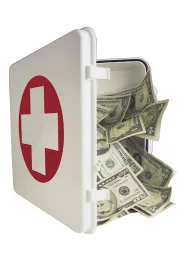As the novel coronavirus (COVID-19) continues to spread globally and the number of cases in the U.S. grows, attention on Capitol Hill has shifted to potential legislative responses aimed at combatting the outbreak and addressing its impact. Last week, the House and Senate passed and President Trump signed into law an $8.3 billion supplemental funding package (H.R. 6074) to provide additional funding to the Department of Health and Human Services, Small Business Administration, and other Departments and agencies to combat the virus.
With that bill now signed into law, attention has shifted to other measures that may be necessary to aid individuals and industries most impacted. In this regard, policymakers have been considering potential short-term tax policy changes that could shore up investor and consumer confidence after two volatile weeks on Wall Street. On Monday, Senate Finance Committee Chairman Chuck Grassley (R-IA) was said to be weighing “targeted tax relief measures.” Although specifics are not yet available, a spokesman for the Chairman said that “[s]everal options within the committee’s jurisdiction are being considered as we learn more about the effects on specific industries and the overall economy.” The remarks came as news emerged that the White House and the Department of the Treasury were working on a measure to address the economic impact of the coronavirus.
At this point, one or more of various proposals could be considered. Previously, President Trump has raised the idea of a payroll tax cut to stimulate consumer spending in the short term. Other Trump Administration officials have discussed tax policy changes, such as deferred taxes, that are targeted at specific industries particularly harmed by the economic effects of the coronavirus, such as the travel and tourism industries. Still other policymakers have discussed making permanent certain provisions from 2017’s Tax Cuts and Jobs Act, accelerating certain deductions, and creating short-term credits to aid businesses amid interruptions caused by the virus. It is unclear what actions, if any, the Trump Administration would be able to take without Congressional action. House Ways and Means Committee Chairman Richard Neal (D-MA) has raised the possibility of working with the Administration on an infrastructure package that could include certain expanded family credits supported by Democrats. Others have questioned whether tax policies are the proper approach. In a joint statement, House Speaker Nancy Pelosi (D-CA) and Senate Minority Leader Chuck Schumer (D-NY) criticized any approach that would constitute “new tax cuts for major corporations,” saying instead that actions such as paid sick leave for employees and measures to combat price gouging are needed.
Discussions will likely continue in the coming days on Capitol Hill and in the Administration regarding additional responses to the spread of the coronavirus.
Senate Continues Consideration of American Energy Innovation Act
This week, the U.S. Senate will continue its consideration of the American Energy Innovation Act (S. 2657), bipartisan legislation introduced by Senators Lisa Murkowski (R-AK) and Joe Manchin (D-WV) that would aim to move the country toward a green energy future. The 555-page legislation combines nearly 50 energy-related provisions. At this point, it appears unlikely that an amendment, proposed by Senate Finance Committee Ranking Member Ron Wyden (D-OR), that would extend various tax incentives for electric vehicles, wind and solar power, and battery storage, among other provisions, will be adopted. The underlying bill is still expected to garner support from members of both parties in the Senate. In the House, however, Democratic leaders have indicated that rather than take up the legislation, they intend to continue working to develop the separate green energy legislation under consideration in that chamber since late 2019.
Hearings
No tax-related hearings are scheduled at this time.








 />i
/>i
